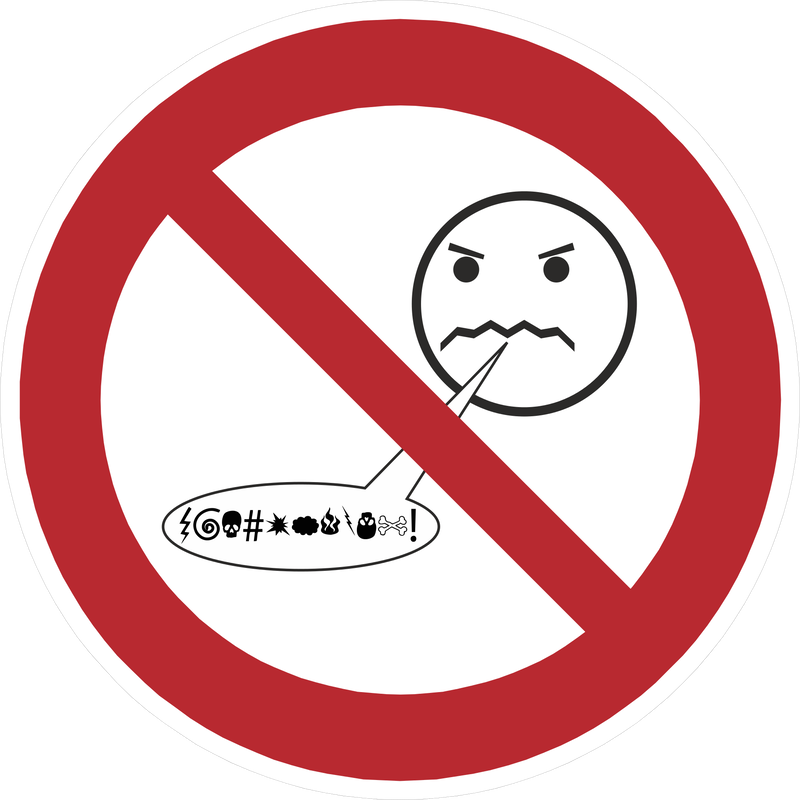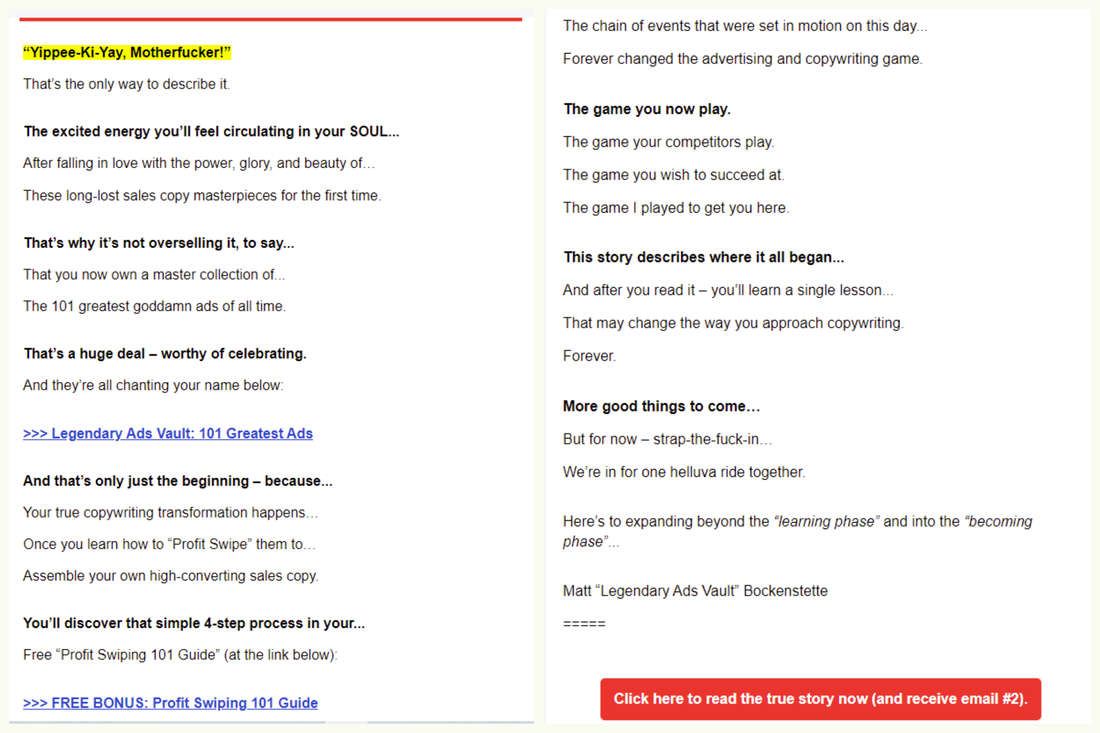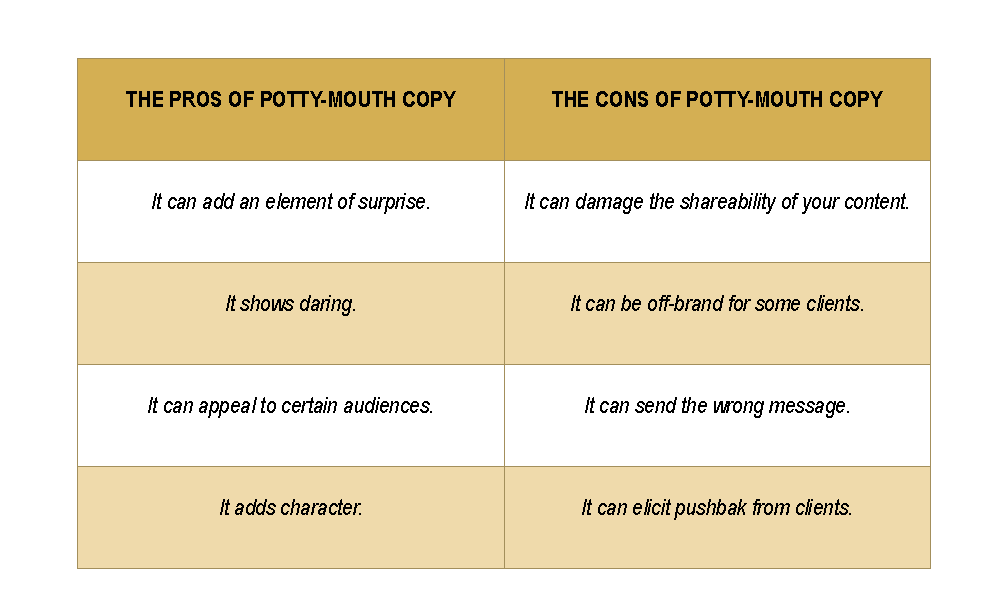|
Potty-mouth copy seems to be making a bit of a comeback these days. It used to be taboo, except for the occasional well-placed damn. Writers would not have thought about ever including the gasp-inducing f word in their sales copy at one time. Now? Everybody and their mother are using impolite colloquialisms like they are the only words in the English language. Earlier today, I came across a marketing and public relations agency in New York with the tagline: “We’re Responsive AF.” Uh, OK. Can I just say the AF part didn’t compel me to click on their contact us link to ask for more information? I wish I could tell you this was a one-off but it’s not. I have sadly experienced quite a bit of this kind of boldness in copy lately. From sales ads and email pitches to hero statements on websites. I would be lying if I said this impressed me. It doesn’t. The few times I’ve gotten an email in my inbox with an expletive in the subject line, it’s gone directly to the trash. This is one of them (see below). I’m not even going to block out the name of the person who sent it. If he’s confident enough to send this to my email inbox, then he should be confident enough for the entire world to critique it. Maybe I’m showing my age by objecting to this kind of “edginess” in advertising. Or maybe I simply believe tossing out every cuss word you know is not the best way to be bold in your copy. The psychology of swearingThere’s no doubt about it. Swearing elicits some strong reactions in some people. Whether you applaud it or cringe every time someone uses it, research has some interesting things to say about the psychology behind curse words. Some evidence points to swearing as a sign of intelligence. Some suggest it’s a great way to relieve pain and stress. Why do profane words upset some of us and make others of us giggle out loud? Profanity has a direct line to our emotional sides. If you grew up in a household where swearing got your mouth washed out with soap, that negative connotation likely has stuck with you throughout the years. On the flip side, living with people who swore loud and proud provided a sense of normalcy in using words others consider taboo. As with many other words in the English language, intent plays a large part in whether a swear word is perceived as offensive. Some profanities could be interpreted as discriminatory or sexually harassing. Brands do not want to cross that line in their quest to sound bold or edgy. Bold…. or just plain crass?Before we can determine whether swearing in copy is offensive, we must ask ourselves what communication goals cursing achieves. Are we trying to be funny? To fit in with the crowd (or target audience, as it were)? Display physical aggression or manage stress? According to Routledge and CRC Press – a leading publisher of knowledge-based materials – there are four main reasons why people swear.
One of the most popular arguments for doing so was that it appealed to millennials. Millennials prefer online communications that show emotion. Plenty of marketing research backs this up. They also respond to authentic and honest branding. Does that automatically mean cursing in copy is cool with them? At least one body of research calls that theory into doubt. Including profanity in shockvertising may not achieve the desired effect. In fact, non-swear word versions of the same ads that used expletives led to better recall among millennials. You’re better off using humor in your copy because 38 percent of millennials love a good laugh. Pros vs. cons of potty-mouth copyTo swear (in your copy), or not to swear? That is the question of the hour. Here is a handy guide of the pros and cons of each side of the argument to help you decide. Euphemisms can be a better alternative to outright swearing in your copy. We can all probably think of some examples of this that we’ve seen. One that immediately comes to mind is Fuddruckers. The folks who branded this company knew exactly what they were doing. Other examples of linguistic creativity in names and marketing copy include one of my all-time favorites, “shut the front door.” A final WTF on potty-mouth copyI know how I feel about potty-mouth copy, but I am not going to push my methods on others. What I will do is offer a final word of advice on how to approach cursing in your writing. If you choose to use cussing in your copy, there should always be a purpose behind the shock value. If you use profanity just because you can, it can dash any hopes you have of sounding edgy.
Whatever language you ultimately choose for your copy, make sure it reaches your target market with messaging that appeals to their demographic. Happy wordsmithing!
0 Comments
|
Categories
All
Archives
April 2024
|



